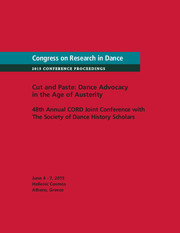Article contents
The Current State of Dance Micro and Macro Policies in Brazil
Published online by Cambridge University Press: 23 September 2014
Abstract
Cultural policies, understood as acts of intervention, not only from the State, but also from social groups and institutions, trigger devices that highlight the complexity of the cultural system and power relationships. These acts, developed in a participatory manner, can contribute to the global re-politicization of collective life.
Regarding Brazil, we can assert the search for common spaces has grown in importance under president Luiz Inácio Lula da Silva's administration (2003–2010), when cultural policies suffered a significant change with the implementation of an inclusive and participatory model. This led to sectorial policies and the creation of public spaces for the representation of civil society. The field of dance took an active role in this process through its associations and regional forums, leading to the creation of a Dance Sectorial Collegiate and a Dance Federal Plan.
Despite some progress that has been made, cultural policies in Brazil are still under the strong influence of a neoliberal approach, which centers its efforts in economic development with a focus on public funding to culture and the creation of funding laws. A participative construction of public policy for dance would be based on agreements between civil society and government, going beyond the financing of arts through grants. The area of dance in Brazil needs structuring programs and actions that would collaborate with the organizational and productive modes of people and groups that are working to develop the area. Thus, this paper discusses cultural policies of dance by pointing out the consequences of “fast-cult” dance production and identifies spaces of resistance and micro-politics, generated by Brazilian artists who are seeking sustainable development and collaborative modes of production in dance.
- Type
- Research Article
- Information
- Copyright
- Copyright © Lucia Matos 2014
References
Works Cited
- 1
- Cited by


